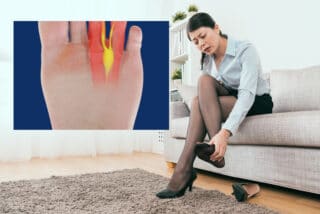
Arlington Podiatry Center
611 South Carlin Springs Road
Suite #512
Arlington, VA 22204

More Podiatry Foot Care Articles
Neuromas Cause Pain and Swelling

A neuroma is a pinched nerve between the metatarsal bones in the ball of the foot causing swelling, pain, inflammation and sometimes numbness. A neuroma most often occurs at the base of the third and fourth toes and occasionally between the second and third toes.
What causes a neuroma? Neuromas can be caused by wearing high heeled or tight shoes. Shoes that are too narrow or pointed squeeze the bones at the ball of the foot. High heeled shoes put additional pressure on the ends of the bones. When the bones are squeezed together they pinch the nerve that runs between them.
The most common symptom of a neuroma is pain in the ball of the foot between the toes. There may be occasional shooting pains through the forefoot or numbness of the toes. The symptoms typically occur after walking or standing for an extended period of time.
Treatment is aimed at decompressing the pinched nerve, reducing inflammation and relieving the pain. Treatment may include wearing wider shoes, using special pads in the shoes and medication. Removing your shoes and rubbing the balls of your feet may temporarily relieve the pain.
If these steps do not relieve the pain a podiatrist may prescribe a regimen of physical therapy ultra-sound, hydro-therapy and/or injections of cortisone with an anesthetic into the interspaces. Custom-made orthotic devices are usually prescribed to control pronation and take pressure off of the nerve.
If these conservative steps fail to relieve pain, surgical intervention may be required. The surgery is an out-patient procedure and the recovery period is usually between three to four weeks. The surgical procedure is generally a reliable and effective alternative leaving most patients pain free and asymptomatic soon after the post-operative period.
If you think you may have a neuroma see a podiatrist for a proper diagnosis and treatment.

















